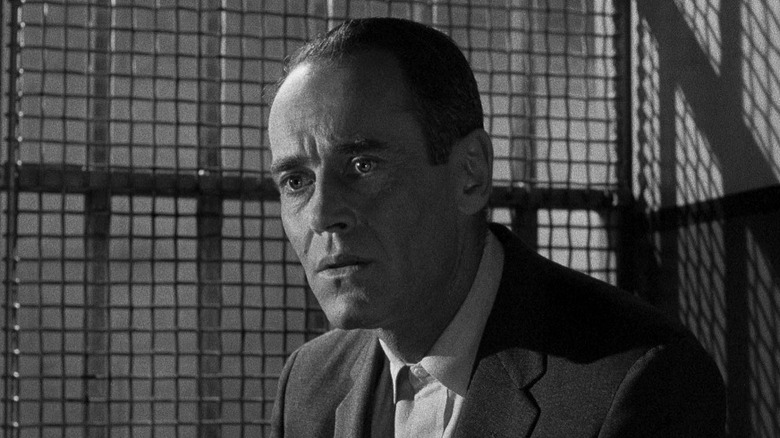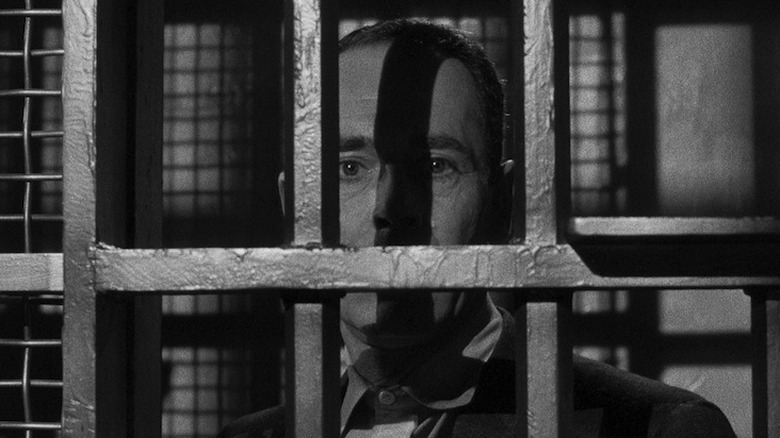Working With Alfred Hitchcock On The Wrong Man Wasn't The Surefire Win Henry Fonda Hoped It Might Be
You know the basics of an Alfred Hitchcock film. Long suspense scenes, twisty murder plots, and blondes. Hitchcock's films were so stylized that his 1956 picture "The Wrong Man" feels anomalous because it's comparitively down to earth. Why the break from convention? It was based on the true story of Manny Balestrero, a New York musician who in 1953 was wrongly accused of armed robbery.
Balestrero, unfortunately, resembled the true culprit, who had previously held up an insurance company's front desk. When Balestrero went to borrow money from said company, clerks mistook him for the robber and he was arrested. Balestrero endured a trial before the right man was caught and the stress threw his wife Rose into a depression. These events are depicted with journalistic detail in "The Wrong Man."
It makes sense that Hitchcock was drawn to the story. Many of his films, including "The Man Who Knew Too Much," "Vertigo," and "North By Northwest," are about ordinary men being swept up in crime. However, "The Wrong Man" lacks any globe-trotting or masterminds. It's instead set entirely in New York City and plays the situation for horror instead of excitement.
There's one more break from Hitchcock's style; instead of his usual leading men Cary Grant or James Stewart, Manny is played by Henry Fonda (though Hitchcock regular Vera Miles plays Rose). Fonda, who reportedly wanted to stretch his abilities as an actor, was excited to work with a director of Hitchcock's caliber. However, it sounds like both Fonda and the public would've preferred a more typical Hitchcock picture.
An unconventional Hitchcock picture
"The Complete Films of Henry Fonda" by Tony Thomas recounts Fonda's choice to star in "The Wrong Man" and the reaction to the film. Thomas is rather down on "The Wrong Man," writing that it, "stands almost like the wrong picture in the Hitchcock gallery," and "[it was] more depressing than it should have been." Thomas' opinion is in-line with that of many contemporary critics; New York Times' A.H. Weiler wrote, "The theory that truth can be more striking than fiction is not too forcefully supported by the saga of 'The Wrong Man.'"
Thomas, unsurprisingly, does praise Fonda's performance as Balestrero, saying the actor's age (Fonda was 51 upon release) added to his humanity and sadness onscreen. Per Thomas' account, Fonda was likewise complimentary of Hitchcock's process, if not this particular result. Thomas writes:
"[Fonda] admired Hitchcock's preparation, his 'blueprint' method of making films, and how he always knew precisely what he wanted. His direction was sparse because he hired the actors he knew could provide what he needed."
While Fonda would have preferred an immediate hit, "The Wrong Man" has found its audience over time; artistic experiments in its ilk often do. Richard Brody of The New Yorker praised the film:
"Few films play so tightly on the contrast between unimpeachably concrete details and the vertiginous pretenses of reality. Hitchcock's ultimate point evokes cosmic terror: innocence is merely a trick of paperwork, whereas guilt is the human condition."
I side with Brody, not Weiler. If there's a flaw in "The Wrong Man," it's one shared with most other Hays Code crime pictures: the closing moments deliver an undercut of a happy ending. Besides that, the film's message remains relevant and Fonda is such a natural fit you'll wish he and Hitchcock had worked together again.

